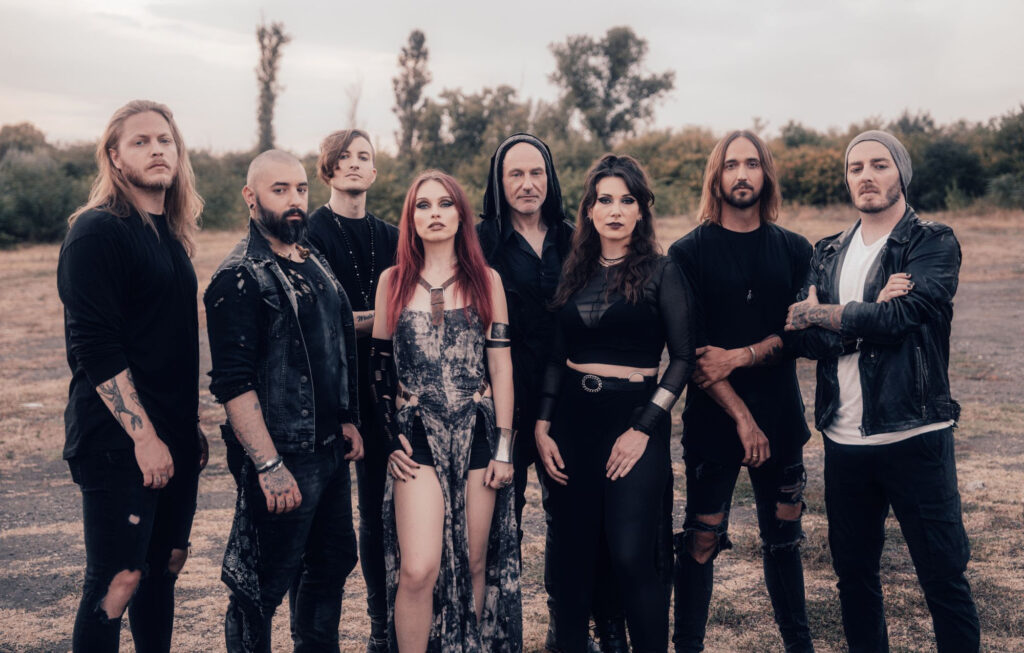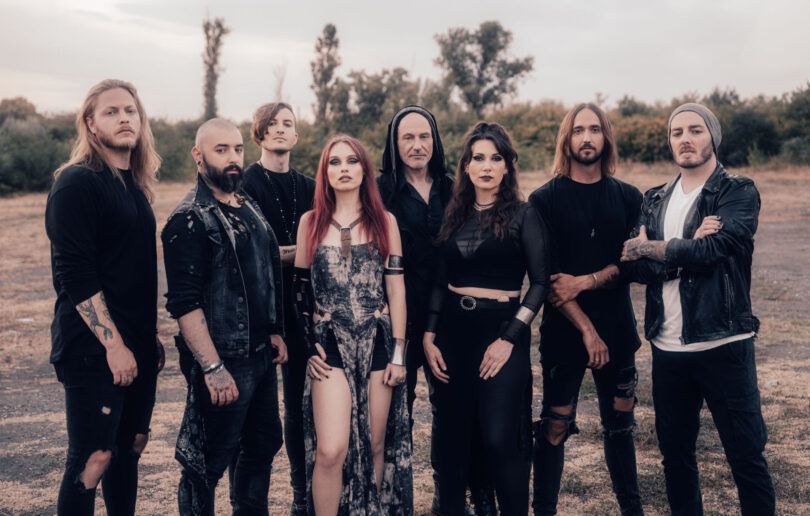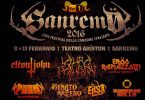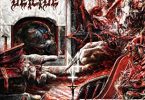In this in-depth interview, we sit down with Chrigel Glanzmann, Eluveitie’s frontman, who reflects on the creative process behind their latest album “Ànv”. Known for blending ancient languages, mythological themes, and Celtic traditions, Chrigel takes us on a journey through the inspirations, challenges, and profound ideas that shaped their new work. From exploring the deep philosophical layers of ancient texts to the personal growth and struggles that influenced the music, we discuss everything from the album’s themes to the band’s experiences on the road.
[ENG]
- Hello Chrigel and welcome on Heavywords.com. It’s a pleasure to have you here. How are the things going so far?
Well, first of all, thank you very much for having me. And yeah, things are going pretty well. I mean, we are obviously very busy right now with the release of our upcoming album and everything around it. Still working on a lot of stuff to come, like more video clips and everything. So yeah, it’s been a busy time, but good.
- “Ànv” marks a new chapter for your band. How was the creative process for this album? I imagine it was quite different from the previous one, was there anything new about it?
Kind of yes, mainly because a lot of unexpected things happened along the way. What was most different is that the whole process took much longer. I mean, it’s been almost six years since we released our last album. We actually started working on the concept for “Ànv” back in the summer of 2019, I think. We were still on tour at the time, and then the pandemic hit, which made everything way more complicated. Right after the pandemic, just as things were starting to open up again, a lot of things in my personal life turned upside down. I didn’t have the chance to focus on the band the way I used to or should have. So, overall, yes, it took much longer. But at the same time, the process became even more collaborative. It was really a mash-up of ideas from everyone. We worked a lot together on this album, even in the studio, where we left a lot of things open to happen spontaneously. And I think you can really hear that in the final result.
- And what themes or emotions did you focus on the most during this creative process? Of course, this time of, how can I say, not really a stop, but you had your issues, your problems and everything that slowed down your creative process. How did these things influence the themes and emotions you were trying to express with the album?
Okay. Do you have like three hours? (laughs) No, I’ll try to keep it short. But in a way, “Ànv” is kind of a development of “Ategnatos“, I would say thematically and emotionally as well. I mean, for us, it’s always super important that music and lyrics go hand in hand. And even if I don’t have the lyrics completely finished for a song, I already know what a song will be about lyrically before we start writing the music for it, just because for us it’s really, really important that the music also expresses what the lyrics are about. And in that sense, you know, “Ategnatos” was a deeply mythological album in a way. And so is “Ànv“. I think during the creative process of “Ategnatos“, it was really, really intense. I mean, obviously, Eluveitie is Celtic all the way through since the beginning. Everything about us is deeply Celtic and pagan and everything, of course. But it was still special for “Ategnatos” when we dived into this really deep. And yeah, I have to say, really deep topics of mythology, of Celtic mythology. And, you know, when creating “Ategnatos“, it wasn’t only about dealing with these ancient words and texts and scriptures just to get songs and lyrics. It was also about dealing with these ancient words for ourselves, you know, for our personal lives and growth and development and everything. And that kind of got the process going. And that process just kind of kept on going until today. So yeah, also “Ànv“ is a very, very deep album lyrically. It goes very far. And to put it in short words, the whole album is actually based on an ancient text that is, we don’t know exactly today, but it’s around 4,500 years old. So, very old. And that text is, I mean, the version we still have today is like 4,500 years old. According to that version, this text is called “The Lament“. So it’s kind of a song. But if you read through it, it comes across a bit more like a prophecy, almost, especially if you’re living today. Because, simply put, that text describes the Celtic eschatology, which means like the philosophical or mythological teaching of, how do you say, the apocalypse or the end of the world or something like that. But in our culture, in our understanding, and I have to say, it’s not only in the Celtic culture, it’s actually in most ancient pre-Christian cultures, it’s the same. We’re not talking about like an “end of the world” or something like that. It’s more about eternal cycles that keep on going, you know, recurring cycles in which the whole cosmos is being renewed and so on. So it’s more about death and renewal, not about an end. So yeah, that’s, in short words, what this ancient text is about. And the crazy thing about it is that the main focus in this text is, I mean, of course, it’s about humans and how they developed and how they will develop towards the end of this era and all that, but the main focus is actually mankind’s relationship to what we humans today call “nature”.
And there it already begins, you know? Because in our Celtic understanding, and also according to this text, there is not humans and nature. There’s one thing. There’s one creation, and we are all one. But we modern humans just separate that, and we think of ourselves as something separated from the rest, which is kind of difficult. At least in our understanding, this is difficult. So this is the main focus of this ancient text. It describes how humans will develop over the centuries, and it describes how they will be consumed by their own greed, and so on. And then, at the end, shortly before the end of the era, the text speaks about what’s going to happen because of that. And there’s quite a lot of quite impressive, sometimes also a bit shocking, things in this ancient text. For instance, it says that globally the soil will go dry, which today we actually see happening, and it’s becoming a huge, serious problem for us humans. Or it says that globally the air will be polluted. It says that there will be dead zones in the oceans. It says all these things. It says that the climate conditions will go completely out of hand. It says that globally, big floods will occur, that huge forest fires will occur. It states that pandemics will arise. And then, you know, basically everything that shapes our lives today.
- Yeah, they are already happening...
And so this is quite impressive if you read these lines and keep in mind that this text was written down more than 4,000 years ago. That’s quite crazy and impressive. So in that sense, it’s a pretty deep and also thought-provoking album. But to come back to the beginning of your question, sorry, I’m talking a lot. I told you I’d need three hours…
- I like talking in this way. It’s more like a chat and not an already-made-questions interview..
Good, then I’m happy (laughs). No, but to come back to your question and the beginning of my answer: I started with the personal development and everything. That’s only one side of this ancient text. And in our Celtic understanding, and that’s also strongly reflected in this ancient text, we always deal with a very strong, how do you say, duality. Everything we see, we actually see happening around us in our lives, in our world, which in our culture we call the manifest world. You know, the things you can see with your eyes of flesh and blood and can touch. All these things we see happening in this manifest world are virtually just reflections of the same struggle that’s happening in another dimension, within ourselves.
So, put in very short and easy words, you could say that, according to this ancient text, all the struggle there is today between humans and nature, or Mother Earth, are basically reflections of a struggle that’s also going on within ourselves: between our soul and our ego, so to speak. And yeah, that’s basically it. That’s the core of this ancient text. And also that duality is something we tried to reflect and depict in the album. And that’s why I said it’s a very deep album, and also a very personal one. It’s also a lot about what we experienced within ourselves, in our lives, in our souls, in our thoughts during the last years. And the album just strongly reflects all these things, also emotionally.
So I would say it’s a very, very earnest album. There are also a lot of really earnest, partly sad or angry moments. But there’s also a lot of hope, and emotions of hope,in the album. So now, hopefully, I’ve answered your question.
- Thank you! I felt this also while listening to the album, of course, but in the song “All is One”, I felt it as a unifying message between the dark part of the album and the light part. So is the song reflecting this contrast with some of the darker moments on the album?
Maybe kind of, yeah. It’s actually that. It’s cool how you perceived it, because it’s actually that tweaking point on the tracklist, on the album, where it shifts from looking at what happens to the hope and what’s going to happen. So it’s like the turning point where things become positive in a way.
And yeah, in that song, there’s an image that appears throughout the album, starting already in the first song. And it’s kind of the image. It’s actually a biblical image that I used, because in the Old Testament, as it’s written, they had this, what is called in English, the Tabernacle. This wooden box with the stone tablets of Moses in it. And it was kept in a tent and hidden in a shrine, covered by a very, very thick curtain. So no one could ever see that wooden box. And it was said that the presence of God was behind that curtain.
And that’s an image that appears every now and then in the album. Because also in the Bible, there is this moment when humans and God become reconciled with each other, that’s when the curtain in that tent gets torn apart. And people could finally see behind it. And this is pretty much the same thing that’s depicted in ancient Celtic mythology, when it comes to that inner struggle. And in the song “All is One“, it’s also reflected or displayed in the sense of: okay, you’re standing there in front of that presence of God, or that divine presence, whatever you want to call it, and you’re separated by this thick curtain. And at some point, you tear that curtain apart so you can finally see, you can finally look at God. And what happens in this text is that you don’t see an old man, you don’t see an energy, you don’t see anything, but you just see yourself, like a mirror image. And that’s when the text does the twist: you basically see everything in there, all creation, everything. And that’s basically what the text is about. And it even comes with a quote by Albert Einstein (I don’t know if you noticed), but he described something fairly similar in really, really amazing words. Because he addresses exactly what I said before, that we humans today perceive ourselves as something separated from the rest.
And Albert Einstein, after all his studies and research, came to the conclusion that this must be wrong. He called it “an optical delusion of our consciousness”. And he said that he believed the task we humans have in our lives must be to free ourselves from that optical delusion, or to free ourselves from that prison, which is this delusion. And the way he thinks we can free ourselves is by expanding our own circle of compassion, not just for ourselves or a few people close to us, but to all creation.
- That was really interesting. And so, is the title of the album referring to the ancient text?
No, it’s actually the name of our mother goddess. “Ànv” in our culture is the mother goddess for us, mother to all gods and all goddesses. And in our understanding, there is this eternal force, this life force that continuously, throughout all eternity, keeps creating existence. Other cultures have names for it, be it Jehovah, God, Allah, Odin, or whoever. In our culture, we call this force Ananwanakon, which simply means the nameless. Because as we say, that force is alone. There’s only one of it. It doesn’t have multiples. It’s one, so there’s no need for a name. We just call it the nameless.
And all the gods and goddesses we do have are something very earthbound. We basically need them as long as we are in our bodies of flesh and blood on this planet. And so, in that sense, all the gods and goddesses we have are actually just mere reflections of different aspects of that eternal, life-giving force. Within that thinking, obviously, the mother of all gods and goddesses is the Earth itself. Because in our understanding, these deities are earthbound, things we need here on Earth. And so “Ànv” is basically the Celtic mother goddess, simply representing Mother Earth, Mother Nature.
- And there was another track called “Anamcara“. What does this track explore thematically and musically? I think it means “soul friend,” something like that in Gaelic, or was it in another language?
Actually, that’s true, yeah. It basically means a friend, a deep, close friend, to your soul. That’s what Anamcara is. And that’s what we wanted this track, this piece of music, to be. And yeah, it’s very simple. It’s basically just a guitar track that Raphael wrote, also during the studio sessions, actually. And the narrated text you hear there is actually a couple of lines taken from this ancient text the whole album is based on.
- And the track “Ewen“, it’s one of the album’s catchiest songs, as I heard. What was the inspiration behind this song? I know it’s linked to the overall theme of the album, but how does it tie into the narration of the ancient text?
It’s pretty much tied in through the myths of the album, more or less, and also lyrically. On the album, within the tracklist, it basically kind of concludes what happens, what we humans are doing, where we are going, and all that. The chorus deeply expresses, how do you say this, a longing, a yearning for… yeah, basically a yearning for the things to come.
- And you are set for extensive touring in 2025. First, you had your headlining tour with Infected Rain and Ad Infinitum, and now you’ll be touring with Arch Enemy, Amorphis, and Gatecreeper. How do you feel about returning to the road for concerts with different crowds?
Well, let’s see about that. I don’t know. I don’t know who will come to the shows on this tour. But actually, I don’t think it’s that different. I mean, yeah, Arch Enemy is somewhat heavier than Ad Infinitum or Infected Rain. But then again, there’s also Amorphis on this tour, who aren’t very heavy. And also, on the first part of our European tour for this album, we were maybe the heaviest of the three bands. So with Arch Enemy, we’re in good company there, I would say. But I don’t think we’ll play a completely different setlist or anything like that. I mean, we will come up with a new setlist, of course, and not play the exact same songs we just played on this tour. But yeah, we won’t change who we are or how we perform, we’ll just do our thing.
- And since you sing in ancient languages and explore historical themes, have you ever been surprised by a fan interpretation or analysis of your lyrics?
Yes. Yes, very much, very often, actually. Yeah, there are tons of different ways and examples of that. But we’re honestly always amazed by how our fans engage with it. I remember when I started Eluveitie almost 25 years ago. Already back then, we used ancient Celtic language in some songs. But at that time, hardly anyone even knew what Gaulish was. This really changed over the last 25 years. And I’m not saying that’s because of us or anything like that,don’t get me wrong, but things have changed a lot. Science has also made a lot of progress. So today, you can find entire websites written in Gaulish, and there are even Gaulish courses you can take. So yeah, it’s changed a lot. And when it comes to our fans, I think there are now several fan communities around the world that are actually learning and speaking the Gaulish language, which is absolutely mind-blowing to me. And also live, of course I remember this, because it was one of the craziest things we’ve ever experienced, I remember the first time we played in India, for instance. That was many, many years ago. I don’t remember exactly, but probably around 15 years ago or something. We had absolutely no idea what to expect. We didn’t know if there was even a metal scene in India, if people knew who Eluveitie was, if we had any fans there. We just didn’t know anything. We just went there. And then we played our songs. And of course, we also played some songs in Gaulish. And even with those songs, like, everybody in the crowd, as far as I could see, was singing along. Even the ancient Celtic verses. I was completely mind-blown. I couldn’t believe it.
So yeah, definitely, there are a lot of really amazing ways our fans engage with that ancient language.
- What are some of the biggest challenges of keeping a band like yours moving forward, both musically and logistically?
Musically, I have no idea, it just happens, I would say. I mean, it’s not something we work on consciously. We just do what we love and follow our passion and our hearts. And whatever comes out of that, that’s the result. Logistically? No, I don’t really think so. I mean, of course, sometimes it can make things a little bit more difficult. But then again, if you’re working as a professional musician, especially as a touring musician, you need to learn how to work together on a professional level anyway. You have to set your life priorities accordingly. And you’d have to do that no matter if you’re in a three-member band or one with twenty people. So in that sense, I don’t think it makes a huge difference.
- Ok so that was the last question. Thank you so much for your time. Is there anything you’d like to say to your fans or Heavyworlds readers?
Thank you very much. Well, as always, besides thanking you for having me, I just really want to say thank you to all the readers for their interest in our band. It means a lot to us.

[ITA]
- Ciao Chrigel e benvenuto su Heavywords.com. È un piacere averti qui. Come stanno andando le cose finora?
Innanzitutto, grazie mille per avermi invitato. E sì, le cose stanno andando piuttosto bene. Voglio dire, siamo ovviamente molto impegnati in questo momento con l’uscita del nostro nuovo album e tutto ciò che ci ruota attorno. Stiamo ancora lavorando su molte cose che devono arrivare, come altri videoclip e così via. Quindi sì, è un periodo frenetico, ma positivo.
- “Ànv” segna un nuovo capitolo per la vostra band. Com’è stato il processo creativo per questo album? Immagino sia stato abbastanza diverso rispetto al precedente. C’è stato qualcosa di nuovo in particolare?
In un certo senso sì, principalmente perché lungo il percorso sono successe molte cose inaspettate. La differenza più grande è stata che l’intero processo ha richiesto molto più tempo. Sono passati quasi sei anni dall’uscita del nostro ultimo album. Abbiamo iniziato a lavorare al concept di “Ànv” nell’estate del 2019, se non ricordo male. Eravamo ancora in tour in quel periodo, e poi è arrivata la pandemia, che ha complicato tutto moltissimo. Subito dopo la pandemia, proprio quando le cose stavano ricominciando a muoversi, anche la mia vita personale è stata completamente stravolta. Non ho avuto la possibilità di concentrarmi sulla band come facevo prima, o come avrei dovuto. Quindi sì, nel complesso ci è voluto molto più tempo. Ma allo stesso tempo, il processo è diventato anche molto più collaborativo. È stato davvero un mix di idee da parte di tutti. Abbiamo lavorato insieme su questo album, anche in studio, dove abbiamo lasciato molte cose aperte per farle accadere in modo spontaneo. E penso che tutto questo si senta molto nel risultato finale.
- E su quali temi o emozioni vi siete concentrati di più durante questo processo creativo? Naturalmente è stato un periodo con difficoltà, i tuoi problemi e tutto ciò che ha rallentato il processo creativo. Come queste cose hanno influenzato i temi e le emozioni che volevate esprimere con l’album?
Ok. Hai tipo tre ore? (ride) No, cercherò di essere breve. Ma in un certo senso, “Ànv” è una sorta di evoluzione di “Ategnatos“, direi, sia a livello tematico che emotivo. Voglio dire, per noi è sempre stato super importante che musica e testi vadano di pari passo. E anche se non ho ancora completato del tutto i testi di una canzone, so già di cosa parlerà a livello lirico prima ancora di iniziare a scrivere la musica, proprio perché per noi è davvero, davvero importante che la musica esprima ciò di cui parlano i testi.
In questo senso, sai, “Ategnatos” era un album profondamente mitologico, in un certo modo. E lo è anche “Ànv“. Penso che durante il processo creativo di “Ategnatos” sia stato tutto davvero intenso. Ovviamente, Eluveitie è completamente celtico sin dall’inizio. Tutto ciò che facciamo è profondamente celtico e pagano, naturalmente. Ma è stato comunque speciale per “Ategnatos” quando ci siamo immersi così profondamente. E sì, devo dire, in argomenti davvero profondi della mitologia, della mitologia celtica.
E sai, creare “Ategnatos” non riguardava solo il trattare con queste parole antiche, testi e scritture per ricavarne canzoni e testi. Si trattava anche di affrontare queste parole antiche per noi stessi, per le nostre vite personali, la nostra crescita e il nostro sviluppo. E questo processo si è messo in moto, e semplicemente ha continuato fino a oggi.
Quindi sì, anche “Ànv” è un album molto, molto profondo a livello lirico. Va molto a fondo. E per dirlo in poche parole, l’intero album è in realtà basato su un testo antico che ha, non sappiamo esattamente oggi, ma ha circa 4.500 anni. Quindi, molto antico. E quel testo è, cioè, la versione che abbiamo oggi ha circa 4.500 anni. Secondo quella versione, il testo si chiama “Il Lamento”. Quindi è una specie di canto. Ma se lo leggi, sembra più una profezia, quasi, specialmente se vivi oggi.
Perché, per dirlo in modo semplice, quel testo descrive l’escatologia celtica, che significa l’insegnamento filosofico o mitologico, come si dice, dell’apocalisse o della fine del mondo, o qualcosa del genere. Ma nella nostra cultura, nella nostra visione, e devo dire, non solo nella cultura celtica, ma in molte culture antiche pre-cristiane, è lo stesso: non stiamo parlando di una “fine del mondo” vera e propria. È più una questione di cicli eterni che continuano, sai, cicli ricorrenti in cui l’intero cosmo si rinnova, e così via. Quindi si tratta più di morte e rinascita, non di una fine.
Quindi sì, in breve, è di questo che parla questo testo antico. E la cosa pazzesca è che il punto focale di questo testo è, certo, parla degli esseri umani, di come si sono evoluti e di come si evolveranno verso la fine di quest’era e tutto il resto, ma il vero fulcro è in realtà il rapporto dell’umanità con ciò che noi oggi chiamiamo “natura”. Ecco dove inizia tutto, sai? Perché nella nostra comprensione celtica, e anche secondo questo testo, non ci sono gli esseri umani e la natura. C’è una sola cosa. C’è una sola creazione, e noi siamo tutti una cosa sola. Ma noi esseri umani moderni separiamo tutto questo, e pensiamo di essere qualcosa di separato dal resto, il che è un po’ difficile. Almeno nella nostra comprensione, questo è difficile. Quindi questo è il punto focale di questo antico testo. Descrive come gli esseri umani si svilupperanno nel corso dei secoli, e descrive come verranno consumati dalla loro stessa avidità, e così via. E poi, alla fine, poco prima della fine dell’era, il testo parla di ciò che accadrà a causa di questo. E ci sono molte cose abbastanza impressionanti, a volte anche un po’ scioccanti, in questo testo antico. Ad esempio, dice che globalmente il suolo diventerà arido, cosa che oggi vediamo effettivamente accadere, e sta diventando un problema enorme e serio per noi esseri umani. Oppure dice che globalmente l’aria sarà inquinata. Dice che ci saranno zone morte negli oceani. Dice tutte queste cose. Dice che le condizioni climatiche diventeranno completamente fuori controllo. Dice che globalmente ci saranno grandi inondazioni, che si verificheranno enormi incendi boschivi. Afferma che sorgeranno pandemie. E poi, sai, fondamentalmente tutto ciò che oggi modella le nostre vite.
- Sì, stanno già succedendo…
E quindi questo è piuttosto impressionante se leggi queste righe e tieni a mente che questo testo è stato scritto più di 4.000 anni fa. È davvero pazzesco e impressionante. Quindi in questo senso, è un album piuttosto profondo e anche stimolante. Ma per tornare all’inizio della tua domanda, scusa, sto parlando tanto. Ti avevo detto che avrei avuto bisogno di tre ore…
- Mi piace parlare in questo modo. È più come una chiacchierata e non un’intervista con domande già fatte.
Bene, allora sono felice (ride). No, ma tornando alla tua domanda e all’inizio della mia risposta: ho iniziato con lo sviluppo personale e tutto il resto. Questa è solo una faccia di questo testo antico. E nella nostra comprensione celtica, e questo è anche fortemente riflesso in questo testo antico, trattiamo sempre una dualità molto forte. Tutto ciò che vediamo, in realtà vediamo accadere intorno a noi nelle nostre vite, nel nostro mondo, che nella nostra cultura chiamiamo il mondo manifestato. Sai, le cose che puoi vedere con i tuoi occhi di carne e sangue e toccare. Tutte queste cose che vediamo accadere in questo mondo manifestato sono praticamente solo riflessi della stessa lotta che sta accadendo in un’altra dimensione, dentro di noi.
Quindi, per dirla in parole molto semplici, si potrebbe dire che, secondo questo testo antico, tutta la lotta che c’è oggi tra gli esseri umani e la natura, o la Madre Terra, è fondamentalmente un riflesso di una lotta che sta anche accadendo dentro di noi: tra la nostra anima e il nostro ego, per così dire. E sì, questo è fondamentalmente ciò che c’è. Questo è il nucleo di questo testo antico. E anche questa dualità è qualcosa che abbiamo cercato di riflettere e rappresentare nell’album. Ecco perché ho detto che è un album molto profondo, e anche molto personale. Parla anche molto di ciò che abbiamo vissuto dentro di noi, nelle nostre vite, nelle nostre anime, nei nostri pensieri durante gli ultimi anni. E l’album riflette fortemente tutte queste cose, anche emotivamente.
Quindi direi che è un album molto, molto serio. Ci sono anche molti momenti davvero seri, a volte tristi o arrabbiati. Ma c’è anche molta speranza, e emozioni di speranza, nell’album. Quindi ora, spero di aver risposto alla tua domanda.
- Grazie! L’ho sentito anche ascoltando l’album, ovviamente, ma nella canzone “All is One”, l’ho percepita come un messaggio di unificazione tra la parte oscura dell’album e quella più luminosa. Quindi la canzone riflette questo contrasto con alcuni dei momenti più oscuri dell’album?
Forse un po’, sì. È proprio quello. È interessante come tu l’abbia percepito, perché è effettivamente il punto di svolta nella tracklist, nell’album, dove si passa a guardare ciò che accade alla speranza e a ciò che accadrà. Quindi è come il punto di transizione in cui le cose diventano positive in qualche modo. E sì, in quella canzone, c’è un’immagine che appare per tutto l’album, che inizia già nella prima canzone. Ed è un’immagine, anzi, è un’immagine biblica che ho usato, perché nell’Antico Testamento, come scritto, avevano questa cosa chiamata in inglese “Tabernacolo”. Questa scatola di legno con le tavole di pietra di Mosè dentro. E veniva tenuta in una tenda e nascosta in un santuario, coperta da una tenda molto, molto spessa. Così nessuno poteva mai vedere quella scatola di legno. E si diceva che la presenza di Dio fosse dietro quella tenda. E questa è un’immagine che appare di tanto in tanto nell’album. Perché anche nella Bibbia, c’è questo momento in cui gli esseri umani e Dio si riconciliano tra di loro, ed è quando la tenda in quel santuario viene strappata. E le persone finalmente potevano vedere dietro di essa. E questo è praticamente lo stesso che viene rappresentato nella mitologia celtica antica, quando si parla di quella lotta interiore. E nella canzone “All is One“, viene riflesso o mostrato nel senso che: ok, sei lì davanti a quella presenza di Dio, o quella presenza divina, qualunque cosa tu voglia chiamarla, e sei separato da questa tenda spessa. E a un certo punto, strappi quella tenda per poter finalmente vedere, finalmente guardare Dio. E quello che succede in questo testo è che non vedi un vecchio, non vedi un’energia, non vedi niente, ma vedi solo te stesso, come un’immagine nello specchio. E questo è quando il testo fa il colpo di scena: vedi praticamente tutto lì dentro, tutta la creazione, tutto. E questo è fondamentalmente di cosa parla il testo. E arriva persino con una citazione di Albert Einstein (non so se l’hai notato), ma ha descritto qualcosa di molto simile con parole davvero incredibili. Perché affronta esattamente ciò che ho detto prima, che noi esseri umani oggi ci percepiamo come qualcosa separato dal resto.
E Albert Einstein, dopo tutti i suoi studi e ricerche, arrivò alla conclusione che questo doveva essere sbagliato. Lo chiamava “un’illusione ottica della nostra coscienza“. E disse che credeva che il compito che noi esseri umani abbiamo nella vita dovesse essere quello di liberarci da quella illusione ottica, o di liberarci da quella prigione, che è questa illusione. E il modo in cui pensa che possiamo liberarci è espandendo il nostro cerchio di compassione, non solo per noi stessi o per alcune persone a noi vicine, ma per tutta la creazione.
- È stato davvero interessante. E quindi, il titolo dell’album fa riferimento al testo antico?
No, in realtà è il nome della nostra dea madre. “Ànv” nella nostra cultura è la dea madre per noi, madre di tutti gli dèi e le dee. E nella nostra comprensione, c’è questa forza eterna, questa forza vitale che continuamente, attraverso tutta l’eternità, continua a creare l’esistenza. Altre culture hanno dei nomi per essa, che sia Jehovah, Dio, Allah, Odin o chiunque altro. Nella nostra cultura, chiamiamo questa forza Ananwanakon, che significa semplicemente il senza nome. Perché come diciamo, quella forza è sola. Ce n’è solo una. Non ci sono molteplici, è una sola, quindi non c’è bisogno di un nome. La chiamiamo semplicemente il senza nome. E tutti gli dèi e le dee che abbiamo sono qualcosa di molto legato alla terra. Li abbiamo fondamentalmente bisogno finché siamo nei nostri corpi di carne e ossa su questo pianeta. E quindi, in questo senso, tutti gli dèi e le dee che abbiamo sono in realtà solo riflessi di diversi aspetti di quella forza eterna che dona la vita. In questa visione, ovviamente, la madre di tutti gli dèi e le dee è la Terra stessa. Perché nella nostra comprensione, queste divinità sono legate alla terra, sono cose che ci servono qui sulla Terra. E quindi “Ànv” è fondamentalmente la dea madre celtica, che rappresenta semplicemente la Madre Terra, Madre Natura.
- E c’era un’altra traccia chiamata “Anamcara”. Cosa esplora tematicamente e musicalmente questa traccia? Penso che significhi “amico dell’anima”, qualcosa del genere in gaelico, o era in un’altra lingua?
In realtà, è vero, sì. Fondamentalmente significa un amico, un amico profondo e vicino alla tua anima. Questo è ciò che Anamcara è. E questo è ciò che volevamo che questa traccia, questo pezzo musicale, fosse. E sì, è molto semplice. Fondamentalmente è solo una traccia di chitarra che Raphael ha scritto, anche durante le sessioni in studio, in realtà. E il testo narrato che si sente lì è in realtà un paio di righe tratte da questo antico testo su cui si basa tutto l’album.
- E la traccia “Ewen”, è una delle canzoni più orecchiabili dell’album, come ho sentito. Qual è stata l’ispirazione dietro questa canzone? So che è legata al tema generale dell’album, ma come si collega alla narrazione del testo antico?
È abbastanza legata ai miti dell’album, più o meno, e anche tematicamente. Nell’album, all’interno della tracklist, fondamentalmente conclude ciò che accade, quello che stiamo facendo noi esseri umani, dove stiamo andando, e tutto il resto. Il ritornello esprime profondamente, come dire, un desiderio, un anelito per… sì, fondamentalmente un desiderio per ciò che deve venire.
- E siete pronti per un lungo tour nel 2025. Prima, avete fatto un tour da headliner con Infected Rain e Ad Infinitum, e ora sarete in tour con Arch Enemy, Amorphis e Gatecreeper. Come ti senti a tornare sulla strada per concerti con pubblici diversi?
Beh, vedremo. Non lo so. Non so chi verrà ai concerti di questo tour. Ma in realtà, non credo che sia poi così diverso. Voglio dire, sì, Arch Enemy è un po’ più pesante di Ad Infinitum o Infected Rain. Ma d’altra parte, c’è anche Amorphis in questo tour, che non sono molto pesanti. E anche, nella prima parte del nostro tour europeo per questo album, eravamo forse il gruppo più pesante dei tre. Quindi con Arch Enemy, siamo in buona compagnia, direi. Ma non credo che suoneremo un set completamente diverso o qualcosa del genere. Voglio dire, ovviamente prepareremo un nuovo set, e non suoneremo le stesse identiche canzoni che abbiamo appena suonato in questo tour. Ma sì, non cambieremo chi siamo o come ci esibiamo, faremo semplicemente quello che facciamo.
- E dato che canti in lingue antiche ed esplori temi storici, sei mai rimasto sorpreso da un’interpretazione o un’analisi dei tuoi testi da parte di un fan?
Sì. Sì, molto, molto spesso, in realtà. Ci sono davvero tanti modi e esempi di questo. Ma sinceramente siamo sempre stupiti da come i nostri fan si coinvolgano con ciò che facciamo. Ricordo quando ho fondato gli Eluveitie quasi 25 anni fa. Già all’epoca, usavamo il linguaggio celtico antico in alcune canzoni. Ma a quel tempo, praticamente nessuno sapeva cosa fosse il gallico. Questo è cambiato moltissimo negli ultimi 25 anni. E non sto dicendo che sia stato grazie a noi o qualcosa del genere, non fraintendetemi, ma le cose sono cambiate tanto. La scienza ha fatto enormi progressi. Oggi puoi trovare siti web interamente scritti in gallico, e ci sono anche corsi di gallico che puoi frequentare. Quindi sì, è cambiato molto. E per quanto riguarda i nostri fan, credo che ci siano ora diverse comunità di fan in tutto il mondo che stanno effettivamente imparando e parlando la lingua gallica, il che è assolutamente stupefacente per me. E anche dal vivo, ovviamente ricordo questo, perché è stata una delle esperienze più folli che abbiamo mai vissuto, ricordo la prima volta che abbiamo suonato in India, per esempio. Era molti, molti anni fa. Non ricordo esattamente, ma probabilmente circa 15 anni fa o qualcosa del genere. Non avevamo assolutamente idea di cosa aspettarci. Non sapevamo nemmeno se ci fosse una scena metal in India, se la gente conosceva gli Eluveitie, se avevamo fan lì. Non sapevamo nulla. Semplicemente siamo andati lì. E poi abbiamo suonato le nostre canzoni. E ovviamente, abbiamo suonato anche alcune canzoni in gallico. E anche con quelle canzoni, come posso vedere, tutti nella folla cantavano insieme. Anche i versi celtici antichi. Sono rimasto completamente sbalordito. Non riuscivo a crederci. Quindi sì, decisamente, ci sono molti modi davvero sorprendenti in cui i nostri fan si coinvolgono con quella lingua antica.
- Quali sono alcune delle sfide più grandi nel mantenere una band come la vostra in movimento, sia musicalmente che logisticamente?
Musicalmente, non ne ho idea, succede semplicemente, direi. Voglio dire, non è qualcosa su cui lavoriamo consapevolmente. Facciamo solo ciò che amiamo, seguiamo la nostra passione e i nostri cuori. E qualunque cosa ne esca, quello è il risultato. Logisticamente? No, in realtà non credo. Voglio dire, a volte può rendere le cose un po’ più difficili. Ma d’altra parte, se lavori come musicista professionista, soprattutto come musicista in tour, devi imparare a lavorare insieme a livello professionale comunque. Devi stabilire le tue priorità nella vita di conseguenza. E dovresti farlo indipendentemente dal fatto che tu sia in una band di tre membri o in una con venti persone. Quindi, in questo senso, non penso faccia una grande differenza.
- Ok, quindi questa era l’ultima domanda. Grazie mille per il tuo tempo. C’è qualcosa che vorresti dire ai tuoi fan o ai lettori di Heavyworlds?
Grazie mille. Beh, come sempre, oltre a ringraziarti per avermi avuto, voglio davvero dire grazie a tutti i lettori per il loro interesse nella nostra band. Significa molto per noi.







